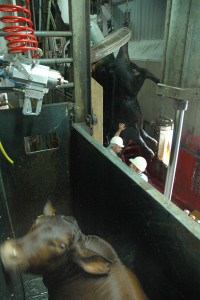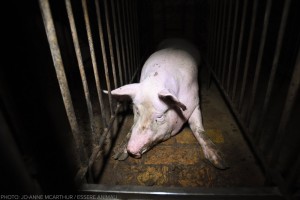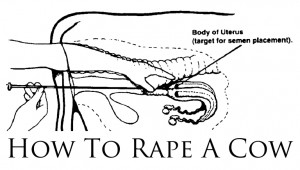I wasn’t always vegan. I know all of the excuses for not being vegan, because I used most of them myself: “We were designed to eat meat. I need meat, dairy and eggs to get my protein. I need milk to get my calcium. It’s too hard to find anything vegan to eat. One person can’t make a difference.”
When I let go of these excuses, I discovered the evidence didn’t support them.
We were not designed to eat meat. Our intestines are much longer than those of carnivores, and allowing rotting meat remains to pass through our long intestines is a recipe for ill-health. Our teeth more closely resemble the teeth of herbivorous primates, except we have even smaller canine teeth.
The Bible (Revised Standard Version) tells us that in the Garden of Eden, God said, “Behold, I have given you every plant yielding seed which is upon the face of all the earth, and every tree with seed in its fruit; you shall have them for food.” (Genesis 1:29) Whilst The Bible does mention giving Adam and Eve dominion over the living things of the Earth, I believe this dominion was meant to be stewardship – caring for the Earth and the living things which she supports. Even after Adam’s fall from grace, God tells Adam: “you shall eat the plants of the field” (Genesis 3:18).
I get more than enough protein from plants. Even body builders, who require a lot more than the normal amount of protein, manage easily on a vegan diet.
I get sufficient calcium and other nutrients from plants. B12 is the only nutrient which is absolutely necessary for vegans to supplement. However, I eat organic potatoes, so I am usually happy to leave the skin on them when I cook them, in order to hopefully absorb some B12 from the soil in which they are grown. B12 deficiency is found in meat-eaters as well.
Trust me when I tell you that, in most western countries these days, finding vegan food is relatively easy. Certainly in Australia, USA, and Britain, vegan food is readily available in supermarkets, and most restaurants. I am someone who loves my food, and I rarely have complaints.
When travelling, it is always advisable to do some research first, just as you would if you were requiring gluten-free food for instance. Even on a recent trip to New Zealand, where the countryside seems to be nearly completely covered with sheep and cattle farms, I managed to find vegan friendly cafes. Given sufficient notice, the chefs in the restaurants at the hotels we stayed in were happy to try their best at providing vegan meals for me, with some doing an excellent job. The more people who request vegan meals, the better these restaurants will be able to cater for them.
When I have taken the time to cook nutritious vegan meals from scratch, rather than grabbing something out of the freezer that was bought from the supermarket, I have created some of the best meals my sometimes-omnivore husband has ever tasted. (In fact, he is pretty keen on some of the vegan processed food I serve him up too.) Often I make extra and freeze it. Also, vegan food has a higher tolerance for less than ideal temperatures. So if there are any power cuts causing the freezer to defrost slightly, it is unlikely that any vegan food needs to be thrown out, as non-vegan food may need to be.
One person can make a difference. If it wasn’t for each one of the people who have become vegan, the demand would not have been sufficient to create the vast array of cruelty-free products currently available. And each person who stops their use of animal products is saving the lives of those animals who they otherwise would have consumed.
I realised that my reason for making all of these excuses was so that I could live with myself, without feeling guilty for every mouthful of food I swallowed. Although I wasn’t feeling the guilt, I was still swallowing it. When we consume animal products, we are consuming the pain and suffering that we have allowed them to endure. As well as stuffing down the food, I had been stuffing down the feelings of empathy for all of the food animals, stopping them from surfacing.
One day, I could no longer ignore the evidence, and I committed to becoming vegan. From that day, I was able to allow myself to feel the empathy that I had previously suppressed.
As a vegan, I was no longer afraid of the guilt I would feel, as I looked at the evidence that shows that animals suffer great trauma at the hands of humans in our factory farm systems. The truth is that animals are no longer treated as sentient beings, but as commodities. The laws which protect our companion animals from cruelty are set aside for those animals whom we consume.
 I saw the fear of the animals as they head for the abattoirs. I saw their discomfort as they ride jam-packed into trucks in scorching heat and freezing temperatures. I heard the plaintive cries of the mothers, whose babies are stolen from them. And I saw the cruel treatment they received from some of the workers in the industry, who had suppressed their empathy too.
I saw the fear of the animals as they head for the abattoirs. I saw their discomfort as they ride jam-packed into trucks in scorching heat and freezing temperatures. I heard the plaintive cries of the mothers, whose babies are stolen from them. And I saw the cruel treatment they received from some of the workers in the industry, who had suppressed their empathy too.
We live in a country where the majority of the population own pets. If asked, most of us would say that we are animal lovers. Yet we allow unspeakable things to be done in our name – things that most of us could never do ourselves if we had to. There is a reason these things are unspeakable, because if we were to speak of them, we would have to face the fact that we could never condone them.
The longer I am vegan, the more unspeakable things I learn of – castration without anaesthetic, grinding up of male baby chicks, and the thing I learned of last night which was the impetus for my deciding to write this blog – fisting of dairy cows.
I heard this term mentioned in a video of a conversation between an animal rights activist and a dairy farmer. Not knowing what it meant, I decided to find out. I wish I hadn’t. This is the picture which I found so repulsive:
Apparently veterinarians or farm workers also do this as a way to check on a pregnancy after the artificial insemination. Compared to having their baby ripped from their side after every birth, perhaps being assaulted like this is not so bad. Every year she is inseminated, and every year her baby is either carted off to slaughter, fattened up as veal, or killed by one of the farm workers. The lucky female calves are fed a milk alternative and raised to be assaulted like this themselves. All so that we can make our lattes, and our cheese.
There are lots of plant-based milk and cheese alternatives now. There is no longer a need for dairy products in our diets.
So, to answer the question: “Isn’t it hard being vegan?”, the answer is definitely NO!
Like any change, it just takes some getting used to. The first couple of weeks were difficult for me, as I spent a lot of my time reading ingredient labels. But there is so much more information available now than there was a few years ago, when I became vegan, and so many more products.
Now, for me, it isn’t hard being vegan. It is hard knowing that most other people aren’t. It is hard, knowing that thousands of animals continue to suffer through horrible lives, just so that humans can eat.
It is hard, knowing that our inability to end the suffering caused to our own food animals makes it difficult for us to convince others that they shouldn’t cause suffering to dogs at the Yulin dog meat festival, to dolphins in Japan’s Taiji Cove, or to animals in the live export trade. Just like our traditional roast lamb or pork dinner, eating dog meat or dolphin meat has been a tradition for many generations.
It is possible to change.
It is necessary to change, if we wish our world to survive.
It is necessary to realise that we are not much different to any of the mammals, or even the birds or fish that we consume. We are all sentient beings – capable of feelings. It is time now to start acting like one.
Previous Blog: Why I Am Vegan



Leave A Comment